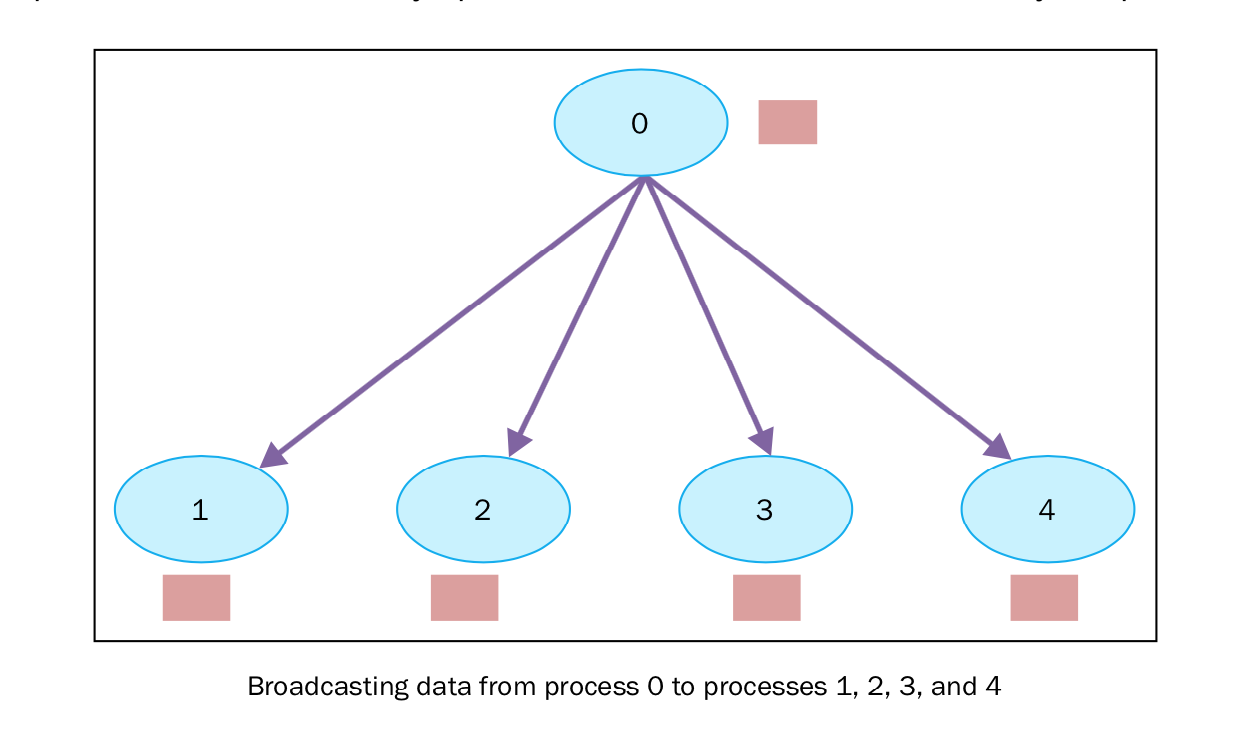Python并行编程
- 本书说明
- 1 认识并行计算和Python
- 1.1 介绍
- 1.2 并行计算的内存架构
- 1.3 内存管理
- 1.4 并行编程模型
- 1.5 如何设计一个并行程序
- 1.6 如何评估并行程序的性能
- 1.7 介绍Python
- 1.8 并行世界的Python
- 1.9 介绍线程和进程
- 1.10 开始在Python中使用进程
- 1.11 开始在Python中使用线程
- 2 基于线程的并行
- 2.1 介绍
- 2.2 使用Python的线程模块
- 2.3 如何定义一个线程
- 2.4 如何确定当前的线程
- 2.5 如何实现一个线程
- 2.6 使用Lock进行线程同步
- 2.7 使用RLock进行线程同步
- 2.8 使用信号量进行线程同步
- 2.9 使用条件进行线程同步
- 2.10 使用事件进行线程同步
- 2.11 使用with语法
- 2.12 使用 queue 进行线程通信
- 2.13 评估多线程应用的性能
- 3 基于进程的并行
- 3.1 介绍
- 3.2 如何产生一个进程
- 3.3 如何为一个进程命名
- 3.4 如何在后台运行一个进程
- 3.5 如何杀掉一个进程
- 3.6 如何在子类中使用进程
- 3.7 如何在进程之间交换对象
- 3.8 进程如何同步
- 3.9 如何在进程之间管理状态
- 3.10 如何使用进程池
- 3.11 使用Python的mpi4py模块
- 3.12 点对点通讯
- 3.13 避免死锁问题
- 3.14 集体通讯:使用broadcast通讯
- 3.15 集体通讯:使用scatter通讯
- 3.16 集体通讯:使用gather通讯
- 3.17 使用Alltoall通讯
- 3.18 简化操作
- 3.19 如何优化通讯
- 4 异步编程
- 4.1 介绍
- 4.2 使用Python的 concurrent.futures 模块
- 4.3 使用Asyncio管理事件循环
- 4.4 使用Asyncio管理协程
- 4.5 使用Asyncio控制任务
- 4.6 使用Asyncio和Futures
- 5 分布式Python编程
- 5.1 介绍
- 5.2 使用Celery实现分布式任务
- 5.3 如何使用Celery创建任务
- 5.4 使用SCOOP进行科学计算
- 5.5 通过 SCOOP 使用 map 函数
- 5.6 使用Pyro4进行远程方法调用
- 5.7 使用 Pyro4 链接对象
- 5.8 使用Pyro4部署客户端-服务器应用
- 5.9 PyCSP和通信顺序进程
- 5.10 使用Disco进行MapReduce
- 5.11 使用RPyC远程调用
- 6 Python GPU编程
集体通讯:使用broadcast通讯
在并行代码的开发中,我们会经常发现需要在多个进程间共享某个变量运行时的值,或操作多个进程提供的变量(可能具有不同的值)。
为了解决这个问题,使用了通讯数。举例说,如果进程0要发送信息给进程1和进程2,同时也会发送信息给进程3,4,5,6,即使这些进程并不需要这些信息。
另外,MPI库提供了在多个进程之间交换信息的方法,针对执行的机器做了优化。

将所有进程变成通讯者的这种方法叫做集体交流。因此,一个集体交流通常是2个以上的进程。我们也可以叫它广播------一个进程发送消息给其他的进程。
mpi4py 模块通过以下的方式提供广播的功能: :
buf = comm.bcast(data_to_share, rank_of_root_process)这个函数将root消息中包含的信息发送给属于 comm
通讯组其他的进程,每个进程必须通过相同的 root 和 comm 来调用它。
如何做
下面来通过一个例子理解广播函数。我们有一个root进程, rank
等于0,保存自己的数据 variable_to_share
,以及其他定义在通讯组中的进程。 :
from mpi4py import MPI
comm = MPI.COMM_WORLD
rank = comm.Get_rank()
if rank == 0:
variable_to_share = 100
else:
variable_to_share = None
variable_to_share = comm.bcast(variable_to_share, root=0)
print("process = %d" %rank + " variable shared = %d " %variable_to_share)和一个拥有10个进程的通讯组的执行输出结果如下: :
C:\>mpiexec -n 10 python broadcast.py
process = 0 variable shared = 100
process = 8 variable shared = 100
process = 2 variable shared = 100
process = 3 variable shared = 100
process = 4 variable shared = 100
process = 5 variable shared = 100
process = 9 variable shared = 100
process = 6 variable shared = 100
process = 1 variable shared = 100
process = 7 variable shared = 100讨论
rank 等于0的root进程初始化了一个变量, variable_to_share
,值为100.这个变量将通过通讯组发送给其他进程。:
if rank == 0:
variable_to_share = 100为了发送消息,我们声明了一个广播: :
variable_to_share = comm.bcast(variable_to_share, root=0)这里,函数的变量是要发送的数据和发送者的进程。当我们执行代码的时候,在我们的例子中,我们有一个10个进程的通讯组,
variable_to_share 变量将发送给组中的其他进程。最后 print
函数打印出来运行的进程和它们的变量: :
print("process = %d" %rank + " variable shared = %d " %variable_to_share)了解更多
集体通讯允许组中的多个进程同时进行数据交流。在 mpi4py
模块中,只提供了阻塞版本的集体通讯(阻塞调用者,直到缓存中的数据全部安全发送。)
广泛应用的集体通讯应该是:
- 组中的进程提供通讯的屏障
- 通讯方式包括:
- 将一个进程的数据广播到组中其他进程中
- 从其他进程收集数据发给一个进程
- 从一个进程散播数据散播到其他进程中
- 减少操作